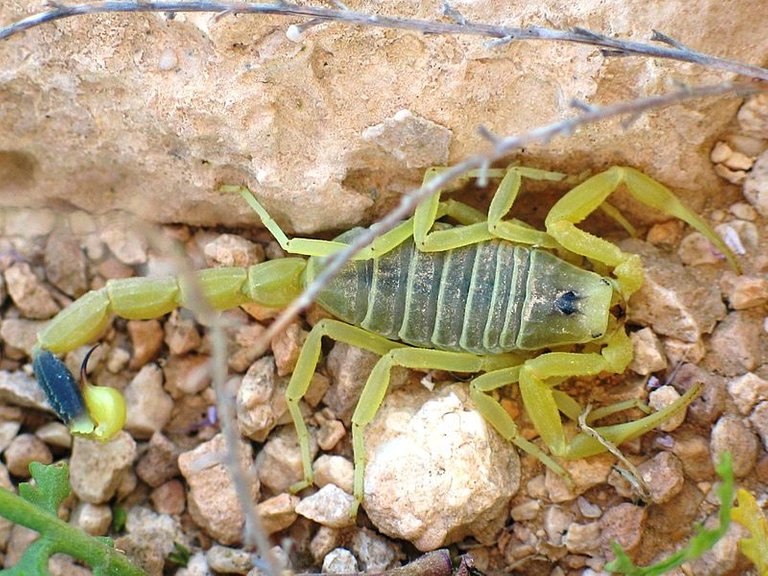Onion and Garlic as Antidotes to Scorpion's stings
Introduction
There is no doubt that alternative and complementary medicine is a field that is fast gaining ground even in the advanced countries of the world. The ethnobotanical and medicinal use of herbs and herbal materials dated as far back as when humans evolved and the socialization of animals took a new turn. As the evolution of man continues, science developed, and detailed inquiries were made into natural phenomena beyond spurious hypotheses camouflaged as theories. The scientific method was developed and up till today, it serves as a guide to those that genuinely wish to inquire into what shapes natural events. Using this guide, tentative statements have the potential to become theories and theories can also become laws. Phenomena that are not tested using the scientific method remain anecdotal at best, and pseudoscience at worst.
The Scorpion's sting story
As a scientist that is always conscious of false claims, my first instinct whenever I see generalized and seemingly untested statements is to ask for scientific evidence in order to ascertain the claims. On this fateful day on Twitter, one of my followers tweeted about the efficacy of onion/garlic mixture as a first-aid treatment against the stings of scorpions. He enthused about how the herbal mixture has worked for him multiple times beyond the array of testimonies that abound both on and offline in support of the claim.

The scientist in me could not allow the information to just pass like that without challenging it. The user has a decent number of followers on the platform and if the information were to be wrong, many would have consciously or unconsciously absorbed it and there is a high probability that such would be the first thing on their minds whenever they witness or become victims of scorpion stings. It might sound like a harmless social media posts but in the real sense, lives could simply be put at risks.
As a graduate of Biological Sciences, Botany to be precise, I know for a fact that there is a chance that a herbal mixture would work against the venoms of scorpions, depending on the phytochemical constituents. Scorpion venoms, and as a matter of fact, other venoms, are proteinous in nature and antivenoms have the capacity to neutralize their effects. A typical antivenom consists of antibodies that are generated from hyperimmunized host animals. Basically, the host animal is injected with the venom or venoms in question, and this triggers an immunological production of antibodies against the venoms. The antibodies are then refined, collected, and stored as a neutralizer of the venoms. ref
This thus means that some herbs contain compounds that can serve as antivenoms. Several species of plants have been ethnomedically used as antivenoms and they function either by directly neutralizing the effects of the venoms or boost the immune system of the victims to produce antibodies against the venoms. One of the phytochemicals that has been widely reported to possess antivenom property is alkaloids. The alkaloids isolated from species of plants such as Solanum spp, Azadiractha indica, Aristolochia radix, Tabernaemontana catharinensis, etc. have been reported to be effective in the in-vitro neutralization of venoms from different species of snakes. ref
Other active metabolites of plants that have been implicated in the neutralization of venoms include phytoacids, steroids, flavonoids, terpenoids, tannins, among others. One important thing to note, however, is that the functionality of these phytochemical groups against venoms generally varies with their sturctures. Hence, a tannin extracted from plant A might work as an antivenom while the one extracted from plant B might not. ref
Onions and Garlic
Onions (Allium cepa) and garlic (Ziginger officinales) have been scientifically reported to have several medicinal properties against a wide range of pathogenic and non-pathogenic diseases (including cancer) based on the active metabolites they contain. More specifically, onions have been reported for its antimicrobial, antioxidant, analgesic, anti-inflammatory, anti-diabetic, hypolipidemic, anti-hypertensive, and immunoprotective effects ref while different compounds found in garlic have been reported to reduce the risk for cardiovascular diseases, have anti-tumor and anti-microbial effects, and show benefit on high blood glucose concentration. ref
Despite both onions and garlic containing some of the phytochemicals that have been reported to be effective in neutralizing venoms from different animals, there are very little scientific evidence to support the claim that they possess antivenom properties.
Why the onion/garlic antidote claim could be wrong
There are over two thousand (2,000) species of scorpions in existence and stings from the majority of them are largely harmless to humans. In actual fact, only about 30 to 40 species contain poisons that are strong enough to kill humans. ref This implication is that, apart from the regions that are known for strong venomous scorpions, the majority of scorpion bites do not require any medical treatment and could pass as a small and short discomfort at best.

Hence, the claim that onion/garlic works as a first aid can be passed on as mere placebo effect in the absence of compelling scientific evidence. However, the fact that both plant species contain phytochemicals that have been reported to be effective in neutralizing a wide range of venoms means that there is a possibility for them to function as antivenoms against scorpion's stings. Until investigations are carried out and credible evidence emerge, the claim remains anecdotal at best.
Thank you all for reading.
Thanks for your contribution to the STEMsocial community. Feel free to join us on discord to get to know the rest of us!
Please consider supporting our funding proposal, approving our witness (@stem.witness) or delegating to the @stemsocial account (for some ROI).
Please consider using the STEMsocial app app and including @stemsocial as a beneficiary to get a stronger support.